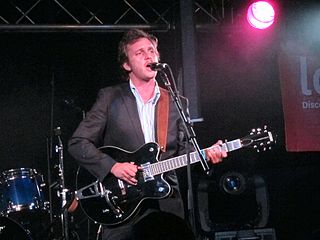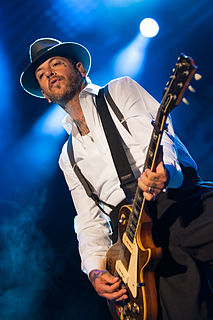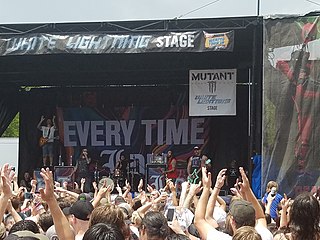A Quote by Jason Mraz
I think more obvious to others, is that I'm most vulnerable on stage. Even though I know which songs I'm going to play, I try and keep it loose and base my stage time more on what the audience is requesting of me.
Related Quotes
Normally classical music is set up so you have professionals on a stage and a bunch of audience - it's us versus them. You spend your entire time as an audience member looking at the back of the conductor so you're already aware of a certain kind of hierarchy when you are there: there are people who can do it, who are on stage, and you aren't on stage so you can't do it. There's also a conductor who is telling the people who are onstage exactly what to do and when to do it and so you know that person is more important than the people on stage.
I'm definitely seeing more and more new people at shows, which is exciting. It's nice for me, because it's a fresh start. I don't feel as obligated to play old favorite songs - it feels like I'm free to try new things because I'm meeting people for the first time. But there's a lot of people who are showing up and they know all the words to the first album and they're requesting songs from the second album.
With theatre, you can interpret the most complex play on stage for it have meaning to an audience because you're dealing in images, you're dealing in action, you can use different idioms to interpret and clarify something which is obscured in the reading and of course there are different kinds of play, there are mythological plays, there are what I call the dramatic sketches, direct political theatre which is virtually everybody, but I find that you can use the stage as a social vehicle, you know, which any kind of audience.
For me, every time I step on the stage it feels like a battle is about to start. It's not like we're going on stage to fight against our audience obviously, because for me, when I go on stage, I'm always trying to reach a new level of how am I going to make today a great night for everyone that's present.
When a theater goes dark for the night, a stagehand leaves a lighted lamp on stage. No one knows why any more, but some old timers say it is to keep the ghosts away. Others say it lights the stage for the ghosts to play. Whichever theory one adheres to, most people agree: a great theater is haunted.
I can feel how an audience is reacting when I'm on a stage, but when you are on stage, your perception is distorted. That's something you just have to know. It's like pilots that fly at high Gs and they lose, sometimes, consciousness and hand/eye coordination and they just have to know that that's going to happen. They have to be trained to not try to do too much while they are doing that. So when you are on stage, you have to be aware that you are wrong about how it feels a lot of times.
The music brings me confidence and freedom. It's also the thing that can make me feel the most vulnerable. Once I finish writing all the songs for an album, once I actually record them, that whole process is usually easy and enjoyable. The part where I feel the most vulnerable is when it's all finished, I can make no more changes, I've turned it in, and there's no going back. All of a sudden I hear the songs in a different way; that's when I feel vulnerable.
We kind of just got more mature and more realistic with what we're doing. We kinda said, "We quit our jobs and we quit college to do this, and we're going to be playing these songs every day just about, y'know, on a stage... so let's write songs that we're never gonna get sick of playing." Songs that aren't just gonna follow a trend of what's going on right now, y'know?



































